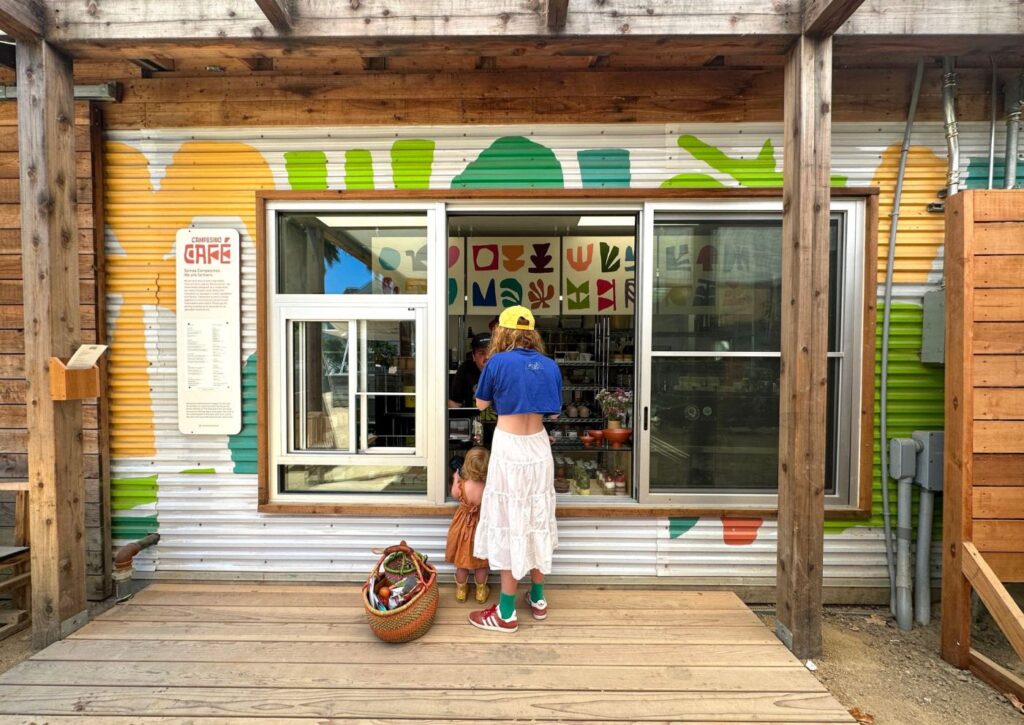
More than just a farm-to-table eatery (which it is) or an outdoor restaurant ideal for families and friends (that too), Campesino Cafe, ensconced in San Juan Capistrano’s lauded Ecology Center’s farm, heralds a shift in the Orange County dining scene: an equitable eatery to enjoy organic and sustainable dishes with plenty of James Beard cachet.
The menu, which changes depending on the season, features items like goat’s milk yogurt parfait with granola, berries and honey; fermented vegetable and salanova lettuce salad tinged with guajillo chile and crunch cover crop grains; or squash blossom salad replete with raw squash and green onion, all of which come in well under $15 a pop. Even the beverage list, which includes cold brews, horchata lattes, and strawberry kombucha, is surprisingly more affordable, yet miles above in flavor and potency, compared to multinational big-name chains.
While locally-sourced eateries are nothing new, they often come with a hefty price tag — understandably so. Certified organic ingredients, which taste superior to their mass-produced counterparts, take time and effort to grow. But at Campesino Cafe, which opened on June 21, dishes are made using hyper-local ingredients (literally a stone’s throw away from the dining area; everything comes from their 28-acre farm or fermentation lab). This helps abate costs making the fine fare here affordable compared to other similar spots that also prioritize ingredient integrity.
Tamales and salsa macha made of roasted vegetables, blue and gold corn masa. (Photo by Jeff Gritchen, Orange County Register/SCNG)
“We focus on the single greatest ingredients available, but we don’t have to pay for produce shipped around the world,” said Jonathan Zaidman, the Ecology Center’s director of impact and partnerships. “We intentionally designed the cafe to be as accessible to as many people as possible.” The famed Ecology Center in San Juan Capistrano opened their new eatery not only a scenic spot for breakfast and lunch, but also to offer a budget-friendly offshoot of their fixed-course Community Table bi-monthly dinners hosted by notable chefs.
In order to harmonize the farm’s sprawling harvest, Campesino enlisted Tim Byers, a Texan chef and author, whose book “Smoke: New Firewood Cooking” won a 2014 James Beard award, to create the cafe’s pared-down menu. Doug Settle, an industry veteran for over 15 years, leads the day-to-day operations in the kitchen as head chef. Their combined output is formidable: tamales and salsa Macha, made of blue and gold corn and roasted vegetables, and the heirloom bean salad in a red chile broth, were notable highlights on a recent visit to the new cafe.
Sitting at Campesino one afternoon, we spotted diners situated at one of the wooden bench-tables outside while nearby Ecology Center farmers get in a solid day’s work. (Fitting as the Spanish word campesino means “farmers” in English.) But the casual vibe doesn’t mean the eatery’s polished aspects go unnoticed. Meals served in matte ceramics provide contrast to the rustic settings. Silverware wrapped in cloth napkins. Mason jars used for the upcycled almond chia seed pudding and a glorious “Campesino Cafe” mural temp customers to snap a pic to slap on their preferred social media channels. Even Orange County’s gastronomic cognoscenti spend their time off at Campesino Cafe (small wonder as Alice Waters, Samin Nosrat, and recent Michelin star-winner Roberto Alcocer of Valle have all hosted dinners or taught classes on the farm).
Upcycled almond pudding with chia seed, farm fruit, almonds and honey. (Photo by Jeff Gritchen, Orange County Register/SCNG)
“The menu does a great job of highlighting the ingredients that come directly from the farm without fuss or fanfare” says Sarah Resendiz, owner of Gema in San Clemente, who, along with Gema executive chef Juan Pablo Cruz, we spotted at Campesino one afternoon. “For us, there really isn’t a better dining room than the actual land where the food was grown and no better company than the people who had a hand in growing it.”
It’s hard not to sense a greater culinary shift at Campesino Cafe, who, along with nearby new-ish places like Heritage Barbecue, Mayfield, El Zarandeado, and Bloom, as well as landmark status-worthy spots like El Coyotito, El Campeon, and El Molino De Oro, has helped spur the historic town, famous primarily for its returning feathered creatures and that centuries-old ode to Spanish colonization, into one of California’s top culinary destinations.
“For many years, Orange County had a lot of long-time restaurants, many of them multigenerational establishments, so it was hard for new restaurants to break in,” says Zaidman, who goes on to say that “there seems to be a lot of young, energetic people with new ideas who are coming to this particular geography of South Orange County, and opening not only new restaurants, but new bars and other new businesses.”
Campesino Cafe is open daily 9 a.m. to 3 p.m. serving breakfast and lunch Wednesday through Sunday, and coffee and pastries Monday and Tuesdays.
Find it: 32701 Alipaz (at Camino Del Avion), San Juan Capistrano
Related Articles
How to get free or cheap guacamole for National Avocado Day on Monday, July 31
It’s fresh fruit pie season at Polly’s Pies
Newport Beach’s newest cafe celebrates plant-based dining
Taco Bell will introduce a birria-inspired taco for dipping
Wendy’s debuts a Frosty version of cold brew coffee
